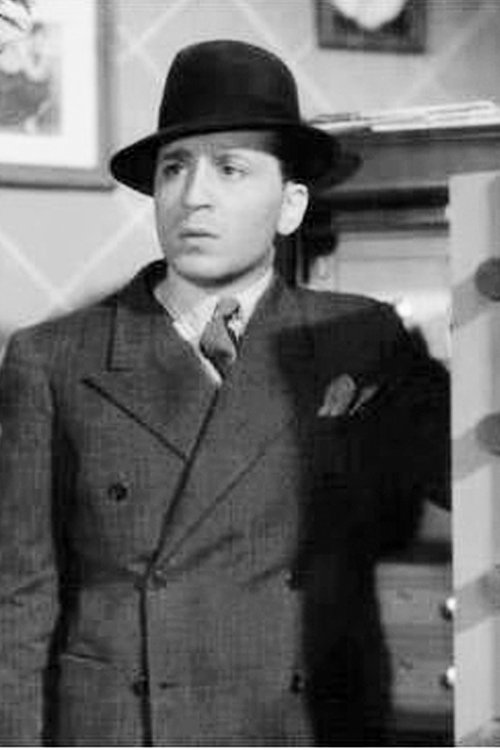|
|
|
|

|
Bruma en el Riachuelo (1942)
Character: N/A
A girl leaves her home after the man who left her with a daughter and a young man who falls in love with her protects her from him.
|
|

|
Oro entre barro (1939)
Character: N/A
A humble bartender wants his minister brother to recognize the son of the woman he abandoned years ago.
|
|

|
Mamá Gloria (1941)
Character: N/A
The romance in a student pension run by a good-natured spinster, between a pensioner and a student gambler.
|
|
|
|

|
Nace la libertad (1949)
Character: N/A
In 1812, the Argentine people and the army of the north resist the royalist advances.
|
|

|
Ayer y hoy (1951)
Character: N/A
This short film is the most famous Peronist propaganda piece, most likely due to the expressionist visual power of Pappier's imagery. It is based on a poem by José María Fernández Unsaín in which a couple of workers (Fanny Navarro and Pedro Maratea) compares a past of explotation and misery with the new Argentina of Peronist social justice.
|
|

|
Pachamama (1944)
Character: N/A
A man intends to cure a blind aborigine, taking her to the city, but her boyfriend wants to stop him.
|
|
|
|

|
El inglés de los güesos (1940)
Character: N/A
A country girl falls in love with an English professor who's in the country studying fossils, but must return to his land.
|
|

|
¡Gaucho! (1942)
Character: N/A
A gaucho flees from justice for murdering a man with whom his girlfriend was betraying him. He settles in a place where he falls in love with a woman, also desired by the local commissioner.
|
|

|
Si yo fuera rica (1941)
Character: Raúl
A screwball comedy about a young barrio songstress and pickpocket who, while escaping after nicking a woman's wallet, is hired to model for an agency. There she discovers a new world when she mixes with the rich and finds love among them.
|
|

|
El festín de Satanás (1958)
Character: N/A
With his own money, Pappier produced this ambitious adaptation of Manuel Gálvez's "Miércoles Santo", whose release was delayed for three years due to political reasons. When it finally came out, it bombed, but its formal originality was mentioned even in unfavorable reviews. Later, it became a cursed film, impossible to see due to lack of prints. To date, it remains lost in great part.
|
|
|
|
|
|

|
Pasaporte a Río (1948)
Character: N/A
A thief commits a robbery and is seen by a showgirl who becomes a witness to the crime. The man finds her and forces her to help him take what he stole to Rio de Janeiro. With no other way out, she is sent on a boat to Brazil by the thief. On board, the showgirl meets a doctor with whom she begins a romance while the criminal falls in love with her.
|
|

|
Ceniza al viento (1942)
Character: N/A
The story of different episodes that happen in each of the sections of a newspaper.
|
|

|
La vuelta de Rocha (1937)
Character: Juan Carlos Peña
A sailor and a tango singer fall in love. To protect her, the man takes her to live with his family. But before embarking, he is robbed, and the circumstances accuse the girl of being an accomplice of the criminals.
|
|

|
Fuera de la ley (1937)
Character: Enrique Varela
A delinquent, the son of a police commissioner, leaves prison to seduce someone who should be like a sister to him: a girl raised and loved by his parents. To force her to give in to his obsession, he kidnaps her little daughter.
|
|

|
Cruza (1942)
Character: N/A
The young daughter of a murdered rancher takes possession of her lands in Patagonia and must fight criminals alongside a teacher.
|
|

|
Mi noche triste (1952)
Character: N/A
The plot reflects the figure of Pascual Contursi, tango poet. In love with a singer, he leaves his wife and son to go with her. Some time later, the singer leaves him and he composes the tango that gives the film its title.
|
|
|
|

|
Santos Vega vuelve (1947)
Character: Juan Sin Ropa
A singer takes possession of a ranch and receives the mission to avenge his ancestor Santos Vega, that legendary payador, and defeat Juan Sin Ropa.
|
|

|
Suburbio (1951)
Character: N/A
Two sisters struggle to get out of a Buenos Aires suburb, where debts with a loan shark have kept them apart. But soon the inhabitants of the neighborhood forget their differences before the appearance of an epidemic.
|
|
























